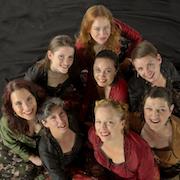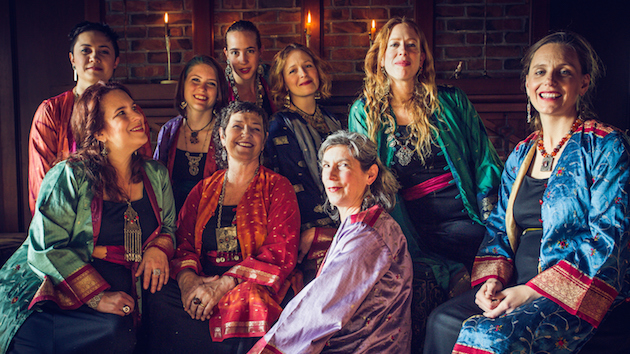
When the world’s oldest song-transmission method meets the world’s most progressive song-production tools and techniques, is it bliss, or a blowout?
The women’s vocal ensemble Kitka specializes in traditional Eastern European songs, some of which predate Christianity and have been passed down by oral tradition — from mouth-to-ear-to-mouth — for centuries. In July, 2016 they launched a step-out-on-a-plank project, “Kitka Remix.” Designed to stimulate creativity and reveal possible future collaborations, the Oakland-based group invited musicians from multiple genres — rap, indie-rock, techno, jazz, classical, electronic, pop, funk, R&B, and more — to toy with Kitka material.
Granted, it isn’t the first — or last — time that traditional and turn-upside-down approaches to music have been combined, but the results so far are irresistible. And an open platform invitation for anyone to alter, add, subtract, distort, dismantle, patch, splice, loop, and by-any-Garageband-means-possible remix Kitka compositions makes the opportunity free and available to everyone. Kitka has provided a toolbox that includes four Kitka tracks, additional stems, and full tracks by the remix artists who have already participated.
That list in itself constitutes a doozy half-dozen: Oakland’s Domino, of the Hieroglyphics hip hop collective; Jim Greer of the beat-driven Rondo Brothers; Judah Nagler of energetic indie-pop The Velvet Teen; Nate “Suave” Cameron and Kevin Seal of the hip-hop-flavored R&B duo Citizen Five, Karry Walker of the folk-electronic music project Ultralash and others.
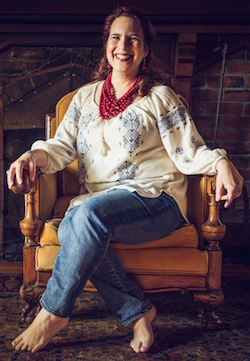
Executive Artistic Director Shira Cion says the project is already offering opposite-end-of-the-spectrum surprises. “Domino selected Shen Khar Venakhi . It’s an icon of Georgian liturgical music. It’s an ethereal, slow-moving, sustained, luminous hymn. The Hieroglyphics are known for more intense beat-driven music.”
Velvet Teen selected Hubava Milka, a Bulgarian tune that has an asymmetrical 7/8 dance structure. Cut and pasted to create an alternative rhythmic structure while preserving the exuberant vibe of the original, Cion says the remix alters her perception of the song. “I imagine a bunch of teenagers rocking out at a dance club with lights flashing like a disco show now.”
Citizen Five remodeled Ayios Vasilis, a holiday carol, reframing the song in a deep, Southern bluesy version that Cion says might actually influence Kitka’s future performances of the work. That remix, the one by Domino, and others have caused some of the group’s folk-song masters to question them. “One of our masters said, ‘You just don’t do that,’ about an earlier acoustic Kitka remix that combined the Georgian hymn Shen Khar Venakhi with a Bulgarian love song, because it’s considered a sacred piece of music. But it’s the 21st century and everything is getting mixed up,” she says.
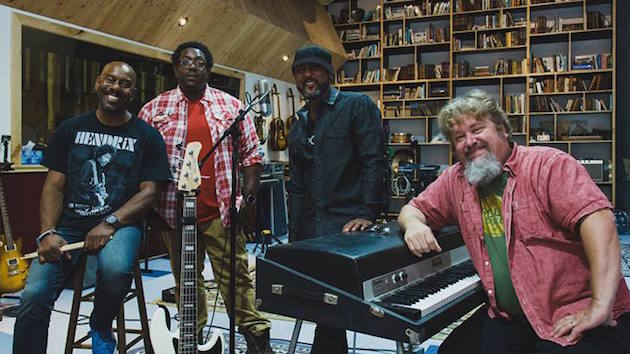
Even to an average observer — if an open mind is applied to finding similarities instead of offenses — close examination emphasizes the commonality of the folkloric model and contemporary forms like rap. The genres emphasize repetition, refrains that articulate a story line, and themes that suggest societal changes are coming — or should be made. In some respects, Cion says, even Kitka’s process of learning their repertoire from folk-song masters is a remix model. “It’s a song going from a visual ritual to a concert piece; from a man’s voice to a woman’s. With the remix project, we’re using technology in the most advanced form. But it’s what people have been doing for hundreds of years: telling stories with songs.”
Cion is pleased at the early response and that the project has already built a bridge to communities and cultures that might have previously been assumed to be disconnected from Eastern European music dating back to the fourth century A.D. Even so, she can’t stop herself from thinking of unclaimed musical territory: remixes by a string quartet, a mariachi fusion band, a jazz composer, and other possibilities.
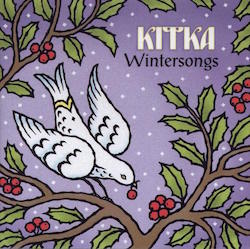
What's not getting turned inside out in all of the creativity is Kitka’s fundamental commitment to preserve the traditions and historically accurate renditions they perform at their annual Wintersongs concerts. This year’s series of six concerts (Dec. 10 – Jan. 14, plus a Dec. 18 Wintersongs Community Sing event) feature ethnic and spiritual songs from Bosnia, Bulgaria, Georgia, Russia, and Ukraine. “Georgia has been a place that we’ve been passionate about lately,” says Cion. “It has the world’s oldest polyphonic folksinging traditions. The harmonies are super juicy, the ornamentation is fascinating, as is the yodeling. A women’s healing song has us intrigued.”
A new studio album, Evening Star, has Cion equally enthused. A sequel to their 2004 Wintersongs release, the all-new collection is focused on traditional songs and Kitka members’ arrangements sung mostly a cappella.

